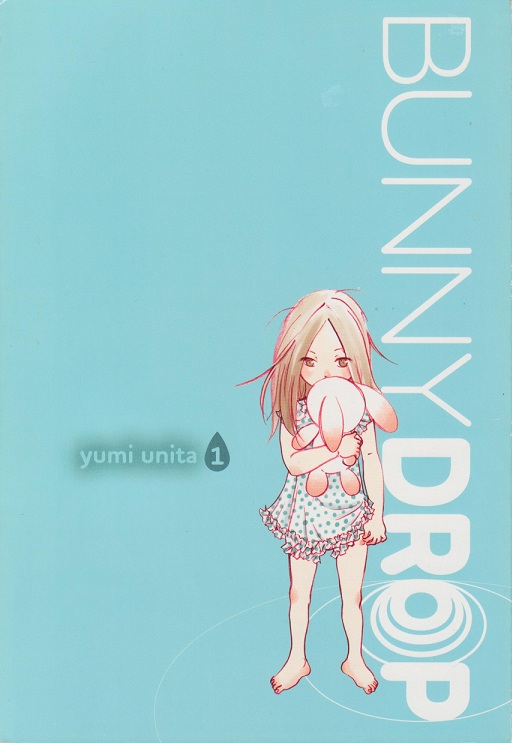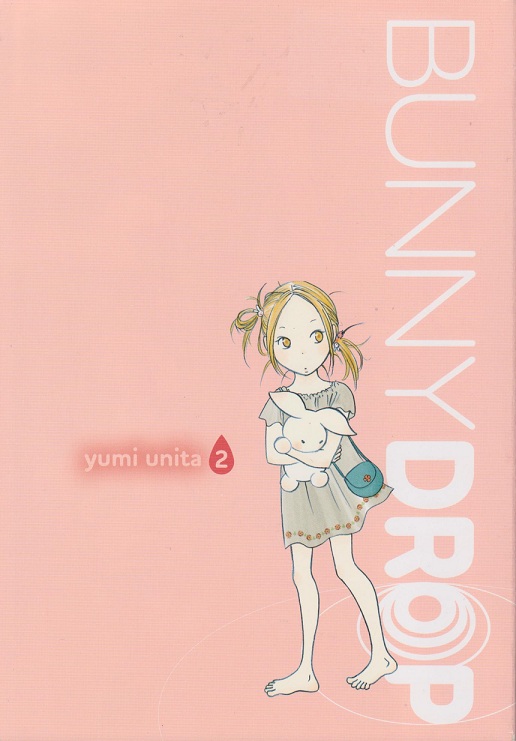 Title: Bunny Drop
Title: Bunny Drop
Author: Yumi Unita
Publisher: Yen Press
Volume: Volumes 1 and 2 (of 9), $12.99 each
Vintage: 2006 and 2007 by Shodensha Publishing Co. in Japan, 2010 by Yen Press
Genre: Josei, drama, comedy, slice-of-life
Thirty-year-old chronic bachelor Daikichi finds quite a surprise when he goes home for his grandfather’s funeral. Apparently his grandfather had a secret love child with his young caretaker, a shy and silent little girl named Rin. With his grandfather now dead, and the girl’s mother nowhere to be found, the family is unsure what to make of or do with the child. No one really wants to take responsibility for the child so, sick of the excuses the members of his family are making, and feeling sorry for the little girl no one wants, Daikichi decides to take her home. For some reason, Rin takes to him immediately, possibly because he looks like his grandfather did in his younger years. Immediately he realizes that he’s a bit in over his head, and must make many lifestyle changes to accommodate a child of six. Fortunately, Rin seems to be on top of things, showing remarkable maturity for a girl her age. When Daikichi takes her shopping for clothes, Rin resolves his cluelessness by telling him exactly what she needs. Daikichi buys all manner of new things for her, including a new bed, quits smoking, and starts keeping his apartment clean. When it’s time to find a daycare for Rin, he agonizes over what will be the best option for both he and Rin, but it’s only a temporary solution. As he weighs his options, he realizes the best thing for them both is for him to cut back at work, so he requests a reassignment, even though it upsets his underlings. At home there are different problems, like when Rin starts to wet the bed at night. Daikichi requests advice from a coworker with a child of her own, Gotou, and solves the issue alongside Rin. He must also explain death to Rin, who becomes worried that Daikichi will leave her like everyone else has. And when Rin’s friends at daycare start asking her questions about her parents, Daikichi must decide how to define their relationship, and if it’s worth tracking down the mother Rin claims to have never met. Eventually he goes to search his grandfather’s house for clues about Rin’s mother, but finds no apparent evidence that a woman, or Rin for that matter, was living there.
In the second volume, Daikichi learns from Rin that his grandfather’s caretaker may have been her mother, but that the two did not get along. Rin barely remembers the woman, but does recall that she doesn’t like her, and that the woman treated her with general disdain. As a great step forward, Daikichi’s family welcomes Rin into their home when they come to visit, and they even warm up to her and she to them. Daikichi is now settling well into his new job, and he and Rin are settling into a nice routine. At the daycare, Rin has made a new friend in Kouki, which makes Daikichi a new friend in Kouki’s single mother (whose name I couldn’t find; I’m not sure she’s been named yet). The two share advice and go through preparing for elementary school together. Preparing for elementary school is rather overwhelming for Daikichi, as he has to label all of Rin’s school supplies, shop for a study desk and backpack, and arrange for after school care. He trudges forward like a champ, however, always making sure that things are good for both he and Rin together. While filling out Rin’s immunization records, Daikichi comes across a web address in Rin’s mother-child health record book. To his surprise, the link leads him to his grandfather’s will, which contains more information about Rin’s mother. This allows him to finally track down Rin’s mother and arrange to meet with her. The petite and blunt young woman takes him by surprise, as does her seeming lack of interest in Rin. Irritated by the woman’s careless attitude, Daikichi throws away all his hesitations and resolves to raise Rin himself from then on. He even considers officially adopting her as his daughter. As Rin prepares to enter elementary school, Daikichi wonders how long it will be before Rin decides she’s too old to do things like sit in his lap, or come to him when she has a nightmare.
 Bunny Drop is incredibly adorable, but so far I haven’t seen why people give it such unceasing praise. It’s a great book to be sure, but there isn’t anything amazingly special about it yet. It’s just a simple story about a single guy raising a little girl. The characters are well formed, and the story is honest and straightforward. Although the artwork is simplistic, it’s well drawn; Yumi Unita has a charming and unembellished style. It’s quite solid all around, and is a pleasant read; there’s nothing expressly wrong with it. However, there’s nothing particularly stellar here either. At least not yet; I haven’t read beyond the second volume. The relationship between Daikichi and Rin is a treat to watch develop. Rin starts off being a little shy, but soon has no problem being up front about what she wants. As a child beginning to grow up, she is hesitant to express things that she feels are insignificant or childish, but a little coaxing from a patient Daikichi is all it takes to get her to open up. Daikichi handles Rin’s bed wetting period with remarkable understanding and patience for someone who’s never raised a kid before, never blaming her, and (once he figures out what’s going on) working together with Rin to solve the issue (it turns out she was afraid to go to the bathroom by herself at night, so he goes with her before bed, and assures her that it’s OK to wake him up during the night). For someone who took her in practically on a whim, he’s doing a very good job of carefully taking Rin’s needs into consideration, and he’s not afraid of changing things in his life to accommodate her. All of his decisions are based on what is best for Rin, even when they’re also what’s best for him (like encouraging her to buy a “big girl” study desk so it will last through most of her primary education, or trying to find a day care close by so he doesn’t have to make Rin ride the packed trains). Aside from his initial impulse, Daikichi takes everything into careful consideration, though even his decision to take her home with him was based on what he thought was best for her (the family was about to send her off to some sort of care facility rather than take her into one of their homes). For her part, Rin is happy to have a place to call home, but she has fears that Daikichi will die and leave her behind (which leads to a very touching scene where Daikichi tries to assure her that he’ll at least stick around until she’s a grown up). Rin is incredibly intelligent and perceptive for her age, and teaches Daikichi just as much as he teaches her. In fact, it sometimes seems as though Rin is the one leading him around by the hand instead of the other way around. Is Bunny Drop an accurate portrayal of single parenting? Not being one myself, I can’t say, but it does handle the subject well, and presents genuine situations that could easily come up in real life.
Bunny Drop is incredibly adorable, but so far I haven’t seen why people give it such unceasing praise. It’s a great book to be sure, but there isn’t anything amazingly special about it yet. It’s just a simple story about a single guy raising a little girl. The characters are well formed, and the story is honest and straightforward. Although the artwork is simplistic, it’s well drawn; Yumi Unita has a charming and unembellished style. It’s quite solid all around, and is a pleasant read; there’s nothing expressly wrong with it. However, there’s nothing particularly stellar here either. At least not yet; I haven’t read beyond the second volume. The relationship between Daikichi and Rin is a treat to watch develop. Rin starts off being a little shy, but soon has no problem being up front about what she wants. As a child beginning to grow up, she is hesitant to express things that she feels are insignificant or childish, but a little coaxing from a patient Daikichi is all it takes to get her to open up. Daikichi handles Rin’s bed wetting period with remarkable understanding and patience for someone who’s never raised a kid before, never blaming her, and (once he figures out what’s going on) working together with Rin to solve the issue (it turns out she was afraid to go to the bathroom by herself at night, so he goes with her before bed, and assures her that it’s OK to wake him up during the night). For someone who took her in practically on a whim, he’s doing a very good job of carefully taking Rin’s needs into consideration, and he’s not afraid of changing things in his life to accommodate her. All of his decisions are based on what is best for Rin, even when they’re also what’s best for him (like encouraging her to buy a “big girl” study desk so it will last through most of her primary education, or trying to find a day care close by so he doesn’t have to make Rin ride the packed trains). Aside from his initial impulse, Daikichi takes everything into careful consideration, though even his decision to take her home with him was based on what he thought was best for her (the family was about to send her off to some sort of care facility rather than take her into one of their homes). For her part, Rin is happy to have a place to call home, but she has fears that Daikichi will die and leave her behind (which leads to a very touching scene where Daikichi tries to assure her that he’ll at least stick around until she’s a grown up). Rin is incredibly intelligent and perceptive for her age, and teaches Daikichi just as much as he teaches her. In fact, it sometimes seems as though Rin is the one leading him around by the hand instead of the other way around. Is Bunny Drop an accurate portrayal of single parenting? Not being one myself, I can’t say, but it does handle the subject well, and presents genuine situations that could easily come up in real life.
If you want more Bunny Drop, you can watch the anime via anime streaming site crunchyroll (under Usagi Drop). There is also a live action film that was released in Japanese theaters this past August.
Also, a reminder: The next Manga Moveable Feast starts this week, on October 5th, and will spotlight Ken Akamatsu’s beloved Love Hina series. Jason of PLAYBACK:stl will be hosting, and has already posted a call for participation.
Kris
kristin@comicattack.net
@girlg33k_kris


Pingback: Tuesday roundup « MangaBlog